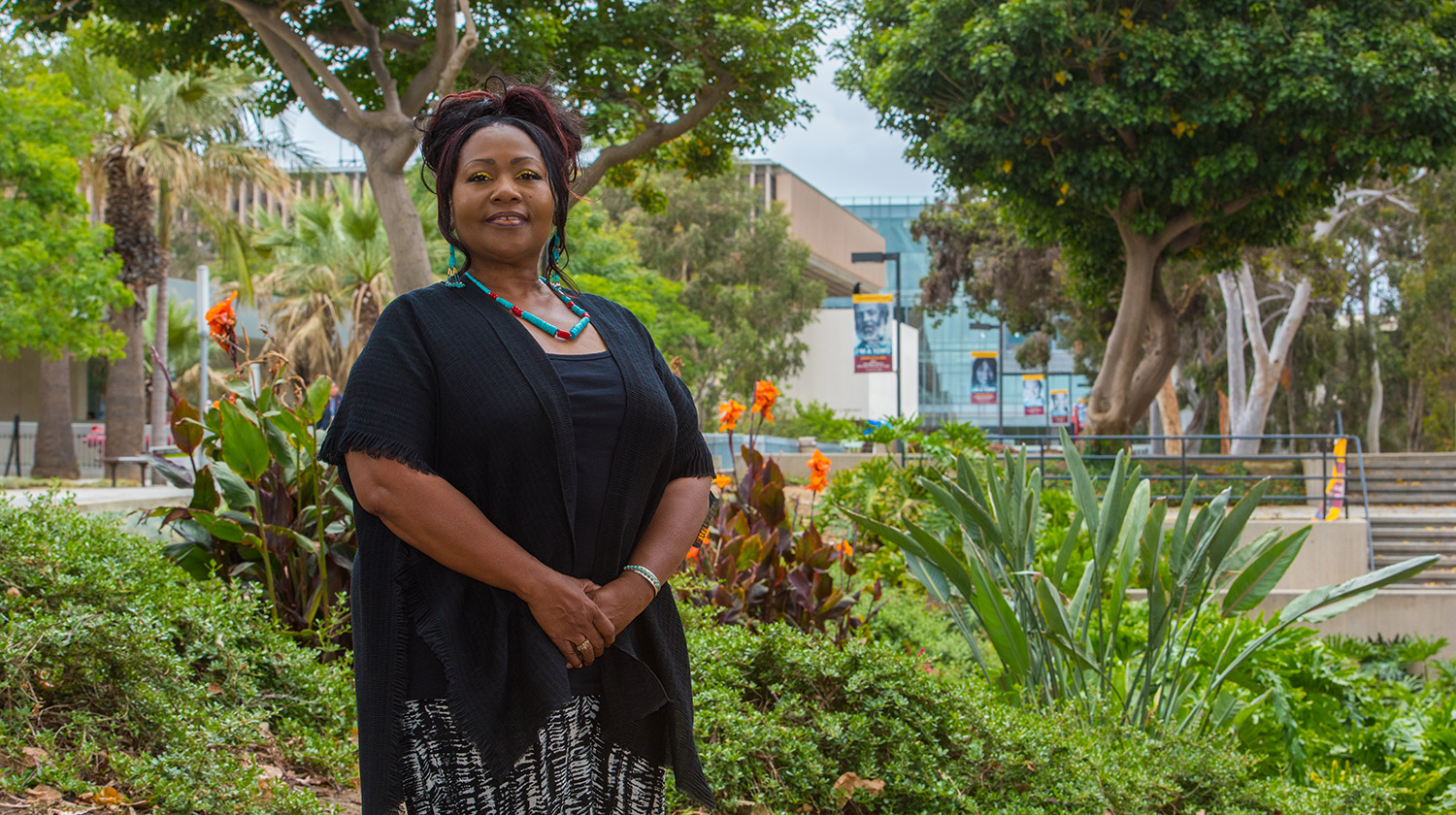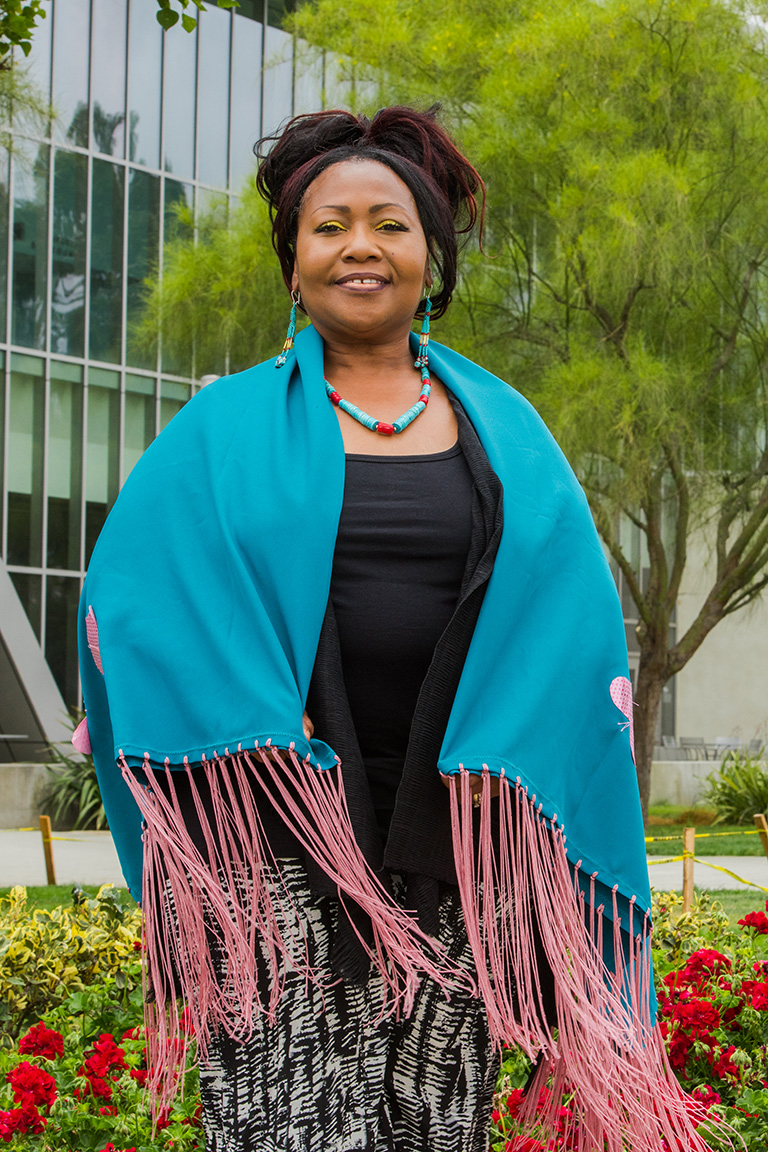
When alumna Suzette Mitchell visited her tribe’s reservation as a child, the children weren’t allowed to play with her. “Some even called me the n-word,” she said. Her grandmother was Goshute–a western branch of the Shoshone nation–and was ostracized after being the first in the tribe to marry an African American, a similar fate her mother shared after being stereotyped as a half-breed.
Mitchell’s family experienced what many African-Native American individuals who stand on the border between two worlds do; they are often not readily accepted as Native American, and misunderstood as bi-racial persons with dual social identities.
“It was very unpopular to marry a Black man back then. However, my Native American grandparents and other family members showed me love and validation, and made me feel welcome. They helped me to feel strength, not fear, but I did feel sad after learning about the plight of my grandmother and mother,” said Mitchell. “My mom had experienced rejection growing up on the reservation, and throughout the course of her life, but I didn’t experience that because she discouraged me from further engagement.”
Mitchell, who graduated with her master’s degree in social work from California State University, Dominguez Hills in spring 2018, is not surprised by the way her family was treated, considering the historical national trauma to African-Native Americans that has resulted in the loss of their cultural identity. To this day, many African-Native American people, and even some Native Americans, tend to remain on the outer fringes of their heritage as they seek validation and acceptance.
The goal is being present for all black-native students and creating an ongoing dialogue on campus. –Suzette Mitchell
Even on progressive college campuses many Native American students still do not identify as such. There are approximately 200 at CSUDH, which is consistent with national low enrollment rates across all college campuses. Finding African-Native Americans among them is particularly difficult.

“In the United States there are many Black Indians, but it’s hard to know exactly how many because their identities were stolen due to the ancient blood quantum laws in this country. It started with the one-drop rule [in 1662], meaning if you had even one drop of black blood you were considered black. It did not matter who you were,” she said. “As a result a lot of them today still don’t know who they are. Some get DNA tests and find out they have native blood, but don’t know where it comes from.”
At CSUDH, there are several resources to help Native Americans find camaraderie and address the fear and/or anxiety of identifying with their culture. The university hosts its own student-led organization called the Native American Indian Association (NAIA), and it launched the American Indian Institute in 2011, which hosts such popular events as the annual Pow Wow.
In 2017, the university began generating awareness of African-Native Americans on campus with a presentation called “Indivisibility: African-Native Lives in the Americas,” which was shown during a public forum organized through the Multicultural Center, the Rose Black Resource Center, and the NAIA.
The forum garnered support from the campus community for the development of a Black Indian student sub-organization of the NAIA. Now launched, the new student club is organized through the American Indian Institute and currently serves 21 members. Mitchell served as president of the organization until she graduated in spring 2018, and believes it may be the first of its kind in the nation.
“It’s a safe place for our people to come and meet other native students because we want them to feel welcome and accommodated. The goal is being present for all black-native students and creating an ongoing dialogue on campus,” she explained.
“I would be available for members and potential new members every Tuesday and Thursday. Some would come in and say ‘I’m a Black-Native, but why can’t I just say I’m native?’” Mitchell added. “People have different perceptions about what native people should be. Being able to say to them that it’s okay to be whoever you want while embracing all of who you are was very empowering for both them and me.”
Along with providing support for African-Native American students, the organization is also engaging the entire campus community.
“We wanted others to get to know Cal State Dominguez Hills’ native students. So we created social mixers, and a gathering called Café Tuesdays where people would come to have some coffee with us and learn about the club and native people on campus,” she said. “We also wanted it to be a bridge to allow others to share their unique cultural diversity as an enlightening exchange of knowledge for everyone. A lot of people showed up, especially faculty and cultural organizations on campus. Even Provost Spagna came, which was really awesome. We really got some momentum going.”
Even with the momentum, Mitchell remains a realist and knows the club has a lot of challenges as long as people are hesitant about identifying as Native American.
“The reality is that disparity rates across the board are still very high, and intergenerational trauma based on historical trauma still exists. In fact, the trauma Native Americans have faced can be seen in their genetic markers,” said Mitchell, who has interned for American Indian Changing Spirits, a residential recovery program targeting American Indian men and women with alcohol and/or drug addiction. “Of course, there’s also the stereotypes of the drunken Indian, and people getting money from their tribes’ reservations and not having to work or pay taxes. So it’s no surprise many people don’t want to identify as native.”
Having earned her master’s degree, Mitchell plans to dedicate time to her non-profit, Crown and Glory Incorporated, which she launched in 2010 and is currently revising.
“Coming back to college has really been empowering, and this university has meant everything to me. It’s very accepting of everyone and a wonderful place to learn,” said Mitchell. “Through my non-profit, I’m going to start my own vocational education program for Native American men and women in recovery and those on the fringes. Its focus will be cosmetology and barbering, and I plan to add a component for other industries, such as welding. The trade industries are getting really hot.”
With Mitchell’s departure, the Native American student organization will need a new president. She does plan to continue to support it as a CSUDH alumni.
“My hope is that someone will take the reins pretty quickly, but I have full confidence in all the members of the organization, and all their strengths. I feel they will all come together and move forward,” she said. “I will come here as an alumni just to show my support. I’m really looking forward to seeing what the future of the club will be.”